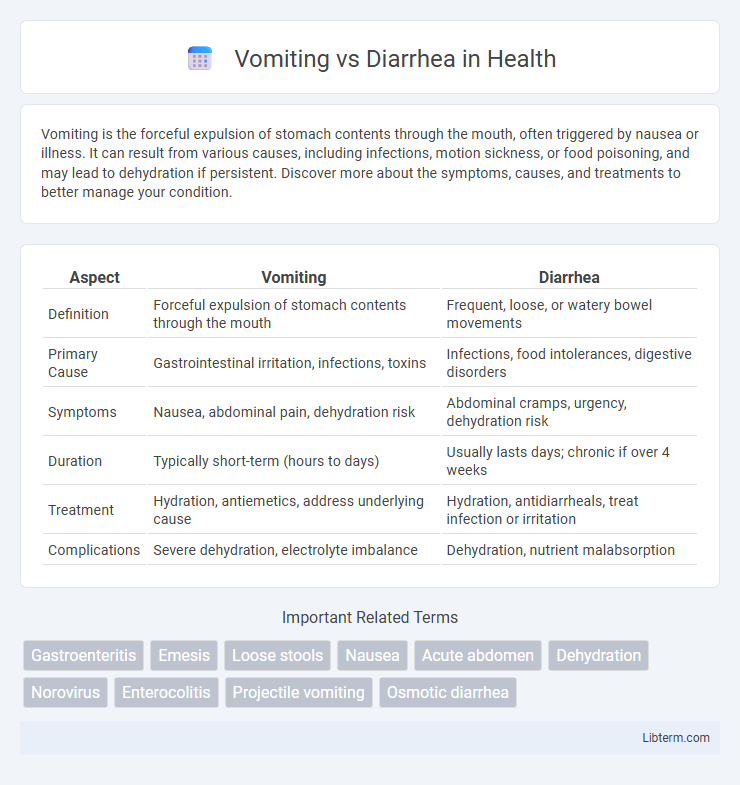Vomiting is the forceful expulsion of stomach contents through the mouth, often triggered by nausea or illness. It can result from various causes, including infections, motion sickness, or food poisoning, and may lead to dehydration if persistent. Discover more about the symptoms, causes, and treatments to better manage your condition.
Table of Comparison
| Aspect | Vomiting | Diarrhea |
|---|---|---|
| Definition | Forceful expulsion of stomach contents through the mouth | Frequent, loose, or watery bowel movements |
| Primary Cause | Gastrointestinal irritation, infections, toxins | Infections, food intolerances, digestive disorders |
| Symptoms | Nausea, abdominal pain, dehydration risk | Abdominal cramps, urgency, dehydration risk |
| Duration | Typically short-term (hours to days) | Usually lasts days; chronic if over 4 weeks |
| Treatment | Hydration, antiemetics, address underlying cause | Hydration, antidiarrheals, treat infection or irritation |
| Complications | Severe dehydration, electrolyte imbalance | Dehydration, nutrient malabsorption |
Understanding Vomiting and Diarrhea
Vomiting is the forceful expulsion of stomach contents through the mouth caused by irritation or blockage in the digestive tract, often involving the brain's vomiting center. Diarrhea involves frequent, loose, or watery stools resulting from accelerated bowel movements or impaired water absorption in the intestines. Understanding the physiological triggers and symptoms of both vomiting and diarrhea is essential for accurate diagnosis and effective treatment of digestive disorders.
Causes of Vomiting
Vomiting is primarily caused by irritation or obstruction in the stomach and upper gastrointestinal tract, infections such as gastroenteritis, motion sickness, or the presence of toxins and certain medications. Central nervous system disorders including migraines, brain injuries, or increased intracranial pressure can also trigger the vomiting reflex. In contrast, diarrhea generally results from infections, food intolerances, or inflammatory conditions affecting the lower gastrointestinal tract rather than the upper digestive system.
Causes of Diarrhea
Diarrhea is commonly caused by infections such as viruses (rotavirus, norovirus), bacteria (E. coli, Salmonella), and parasites (Giardia). Other causes include food intolerances, medications like antibiotics, and gastrointestinal disorders such as irritable bowel syndrome or inflammatory bowel disease. Poor sanitation and contaminated food or water increase the risk of diarrhea, especially in developing countries.
Symptoms: Vomiting vs Diarrhea
Vomiting involves the forceful expulsion of stomach contents through the mouth, often accompanied by nausea, abdominal cramps, and dehydration. Diarrhea is characterized by frequent, loose, or watery bowel movements, abdominal pain, urgency, and possible mucus or blood presence. Both symptoms can indicate infections, food poisoning, or other gastrointestinal disorders, but vomiting primarily affects the upper digestive tract, while diarrhea involves the lower intestines.
Key Differences Between Vomiting and Diarrhea
Vomiting is the forceful expulsion of stomach contents through the mouth, while diarrhea involves frequent, loose, or watery bowel movements. Vomiting primarily affects the upper gastrointestinal tract, whereas diarrhea results from increased intestinal motility or malabsorption in the lower gastrointestinal tract. Both symptoms can indicate infections, food poisoning, or chronic conditions, but they differ in mechanism, location, and associated risks such as dehydration severity.
Common Risk Factors
Common risk factors for both vomiting and diarrhea include infections caused by viruses such as norovirus and rotavirus, bacterial contamination from foodborne pathogens like Salmonella and E. coli, and parasitic infestations such as Giardia lamblia. Other shared risk factors involve food intolerances, medication side effects, and gastrointestinal disorders like irritable bowel syndrome (IBS) or inflammatory bowel disease (IBD). Poor hygiene, consumption of contaminated water, and compromised immune systems also significantly increase susceptibility to these symptoms.
Potential Complications
Vomiting can lead to dehydration, electrolyte imbalances, and aspiration pneumonia if stomach contents enter the lungs, while diarrhea increases the risk of severe fluid and nutrient loss, potentially causing life-threatening dehydration and electrolyte disturbances. Both symptoms may result in malnutrition and weakness if prolonged, especially in vulnerable populations such as infants and the elderly. Timely medical intervention is critical to prevent complications like metabolic imbalances and shock associated with persistent vomiting or diarrhea.
Home Remedies and Initial Care
Vomiting and diarrhea often require immediate home remedies such as oral rehydration solutions to prevent dehydration and maintain electrolyte balance. Consuming clear fluids, ginger tea, and BRAT diet (bananas, rice, applesauce, and toast) helps soothe the digestive tract and support recovery. Rest, avoiding solid foods during vomiting episodes, and gradual reintroduction of bland foods are essential initial care steps to restore gastrointestinal health.
When to Seek Medical Help
Seek medical help immediately if vomiting or diarrhea is accompanied by severe dehydration symptoms such as excessive thirst, dry mouth, dizziness, or reduced urine output. Persistent vomiting lasting more than 24 hours or diarrhea exceeding two days, especially with high fever or blood in stool, requires prompt medical evaluation. Infants, elderly individuals, and those with weakened immune systems should receive urgent medical attention at the first signs of severe vomiting or diarrhea.
Prevention Tips for Vomiting and Diarrhea
Maintaining proper hygiene by washing hands frequently and ensuring food safety through thorough cooking and clean water consumption are essential prevention tips for vomiting and diarrhea. Avoiding contaminated food and drinks, staying hydrated, and practicing good sanitation help reduce the risk of infections causing these symptoms. Vaccinations against rotavirus and other gastrointestinal pathogens also play a critical role in preventing vomiting and diarrhea, especially in children.
Vomiting Infographic

 libterm.com
libterm.com